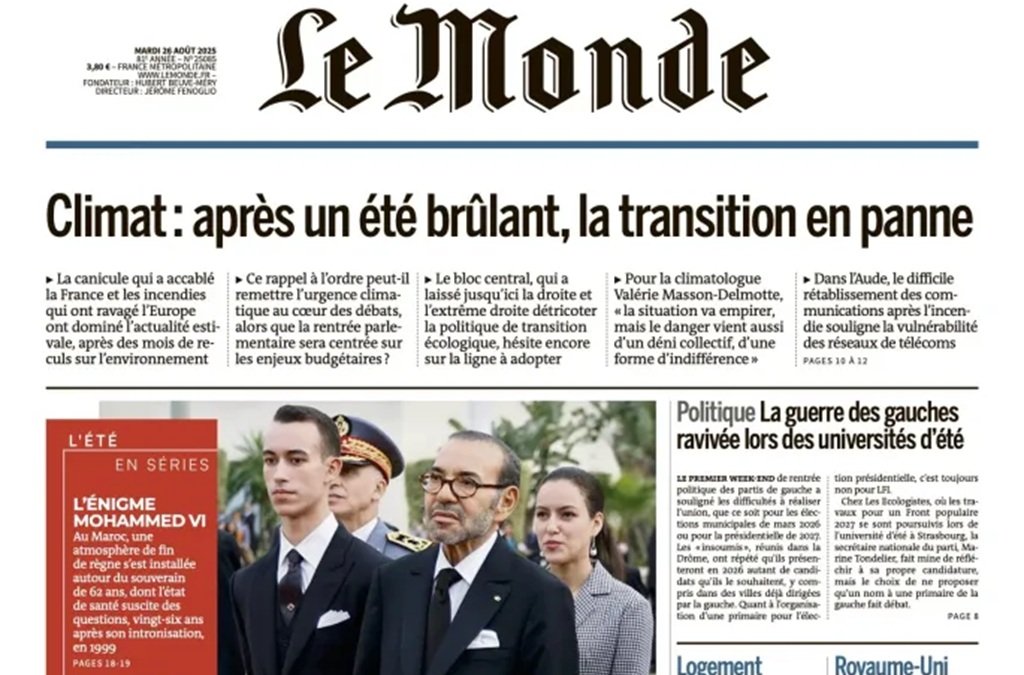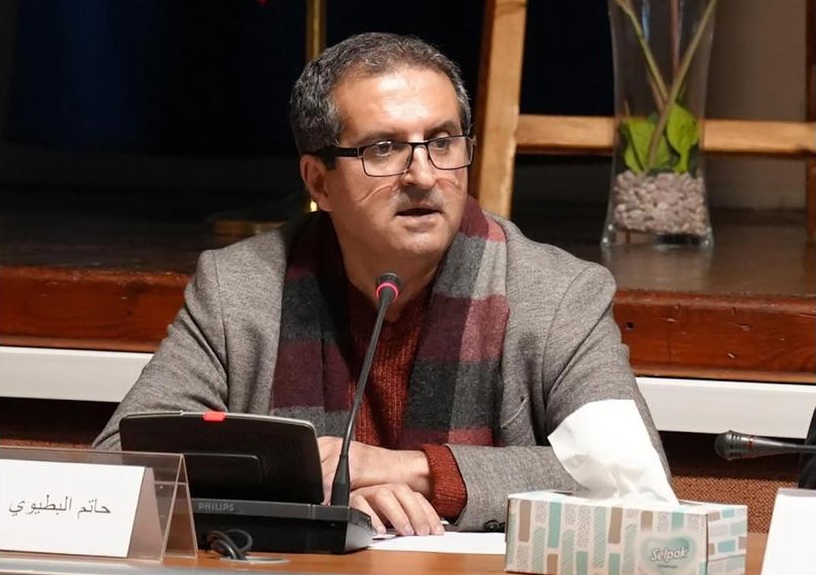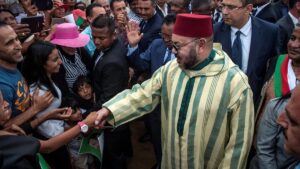Halima returned to her old habits!

Hatem Al-Batawi (Moroccan writer and journalist)
Despite Morocco's liberation from the filth of colonialism in 1956, it continues to be subjected to ongoing blackmail and suffers from the remnants of the colonial mentality of what was known as the "General Residence," which governed the country under the logic of occupation during the French and Spanish protectorates.
Although the era of the French "Resident General" has gone forever with Morocco's independence from France, his behavior is still deeply ingrained in some diplomatic and media circles there.
The occasion for this statement is the recent evaluation by the French newspaper Le Monde of the twenty-six years of King Mohammed VI's reign. With a logic of wishful thinking and delusions, it painted a bleak picture of the situation in Morocco, attacking the king personally and naively claiming that he has no desire to rule. This, to my mind, is the height of slander and a form of delusion.
How could it be possible for the King of Morocco to refuse to rule, when, since assuming the throne in the summer of 1999, he has been diligently, enthusiastically, and persistently engaged in reform projects and workshops that have completely changed the face and image of the country, a change that only a denier, a spiteful person, or someone afflicted with blindness would deny?
For years, it was widely believed that the era of media blackmail against Morocco was over, following the involvement of French journalists Eric Laurent and Catherine Grasset in what became known as the "Blackmail of the King of Morocco" case—an attempt to obtain money in exchange for refraining from publishing a book offensive to the Kingdom of Morocco.
As a result, everyone became aware of the extent of the French media abuse that Morocco had been subjected to over the decades, including the abuses of “Le Monde,” which, like “Halima,” never ceases to revert to its old habits from time to time.
Moroccans also realized that what Le Monde writes is not out of jealousy, but rather out of greed for their country's share whenever what it considers a shareable "pie" appears on the horizon, especially regarding its share of the major construction contracts that Morocco is undertaking to develop infrastructure and basic equipment in the sectors of roads, railways, ports, airports, electricity, seawater desalination, renewable energy, air transport, the construction of major hospitals, the erection of huge stadiums to international standards, the expansion of tramway networks, and even the field of armaments and military equipment, among others.
For Le Monde and its agitators, Morocco has always been an intractable knot. It has yet to accept that Morocco, whose blood was divided among the colonial tribes: Spain in the north and south, France in the west, center, east, and parts of the south as well, was able, after independence, to patiently and steadfastly fight to restore its territorial integrity. Much of its territory had been cut off and annexed to Algeria, which France had occupied for 150 years and never imagined it would ever leave. France then nibbled away at vast tracts of Moroccan land and annexed them to Algeria.
The truth that troubles Le Monde and its sponsors lies in the strength of Morocco's monarchy. For Moroccans, the monarchy has always been an essential "insurance policy" for stability and the unity of the nation.
Le Monde is trying to promote the idea of an "end of an era" in Morocco, as if it were the one that decides and determines the ages of heads of state. This ignores, first, that the Moroccan monarchy has a long history of continuity and religious and popular legitimacy. Second, it insists on ignoring a fact that is obvious to anyone following the situation in Morocco: the issue of revealing the king's health is not a problem in Rabat. Numerous official statements have been issued by the Royal Court, signed by prominent and well-known doctors both at home and abroad, regarding the Moroccan monarch's health since he assumed power. These statements are available online.
The reforms and developments Morocco has witnessed in various fields, especially infrastructure, are ignored and glossed over by Le Monde. Even when forced to acknowledge them, it does not view them favorably. It insists on turning a blind eye to the profound transformation that has marked the past twenty-six years.
Whatever the case, the achievements alone are enough to reveal the momentum the country has experienced under King Mohammed VI. Should we start with the airports spread across the country? Or the ports of Tangier Med and Dakhla Atlantic? Or the highways and the high-speed Al-Boraq train, which arrived in Casablanca years ago and will extend to Marrakech before 2030? Let's not forget the ongoing construction of dams, desalination plants, and renewable energy projects, most notably the Noor-Ouarzazate complex, the largest solar power plant in the world, as well as the construction of major football stadiums, the largest in the Arab world and Africa.
What about major social projects? Aren't the outlines of the gradual universalization of social protection, the expansion of health coverage, and the provision of direct support to vulnerable families clear?
The list of achievements is long and broad, and like the sun, it cannot be hidden with a sieve. As for the regurgitation of rumors and dark wishes that wish Morocco all that is ugly and distort all that is beautiful, it has become a vulgar joke that convinces no one.
It is well established that the tremendous development witnessed by Mohammed VI's Morocco disturbs external parties that sought to make the Kingdom a backyard for their colonial influence, forgetting that a new reality exists in Morocco today, evidenced by the successive diplomatic breakthroughs achieved by the King, especially regarding the Moroccan Sahara issue. This followed the recognition of Moroccan Sahara by major powers and their support for the autonomy plan, most notably the United States, France, and Spain. Furthermore, the Kingdom is hosting the 2030 World Cup with Spain and Portugal, which has earned Morocco international respect and appreciation.
King Mohammed VI has never paid attention to the rumors and false news that are being repeated and recycled from time to time. He has based his rule on hard work and perseverance, paying no attention to idle talk and idle talk.
Perhaps the degree of inconvenience Morocco has caused them has led them to continue challenging the foundations of its stability and tranquility. In recent months, we have observed how its internal and external security apparatuses have been targeted, sometimes by local tools led by a group of extremist nihilists loyal to foreign agendas, and sometimes by foreign pens publishing articles in Western newspapers, believing their publications will have an impact inside Morocco.
These people forget that the Kingdom, like other countries, does not claim to be free of social problems, but rather works to overcome these problems and shortcomings by expanding development, addressing imbalances, and implementing necessary reforms.
The King, as a descendant of a monarchy dating back twelve centuries, has been fully aware, since assuming the throne, that the country faces challenges and ambitions that must be confronted wisely and decisively. He has consistently highlighted these challenges in his official speeches, without waiting for a newspaper to raise them or remind him of them. The most recent example was in his Throne Day speech on July 30, when he emphasized the need to put an end to Morocco's two-speed system, i.e., to eliminate social and spatial disparities.
The way some European circles treat the Moroccan monarchy with disparagement and blackmail demonstrates their ignorance of its symbolism and pivotal role in preserving the nation's cohesion and unity. They have yet to comprehend that Moroccans follow the religion of their kings and are extremely concerned about their country in good times and bad.






